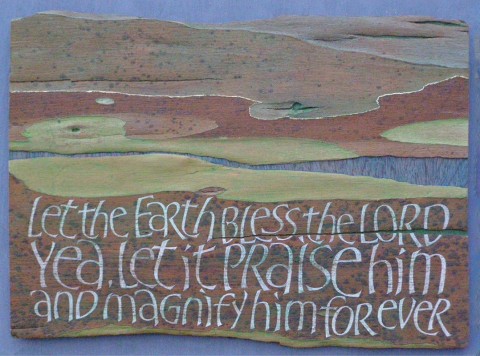Praise, by Martin Wenham

For decades, British artist Martin Wenham has been honing and reinventing the art form of lettering in wood. Here he sets a line from the Benedicite, a canticle based on the song of the three young men in the fiery furnace in Daniel 3. Echoing Psalm 148, the text invites all creation to praise God. In the artist’s hands, this mute wood responds.
Wenham crafted this painted panel with lettering from two strips of shed eucalyptus bark glued onto plywood. He makes the bark proclaim its praise, mixing minuscule and majuscule letters to fit the visual design. The letters change size to echo the cadence of chant, to louden the words praise and Yea.
Wenham frequently uses found wood—wood that has history, as he puts it. The matter matters as much as the words. This liturgical line leaps from the mouths of the three young men as they are saved from death. Fittingly, eucalyptus trees are highly flammable, in part because of their shed bark. Already dead after falling from the tree, these bark bits would have decomposed into the dirt had Wenham not saved them. Now they live and speak.
As a British lettering artist, Wenham draws inspiration from the likes of Eric Gill and David Jones. But in making mute objects speak, his art reaches back to an older heritage of talking things in the British Isles: the Ruthwell Cross and its poem, The Dream of the Rood, an Old English vision of Christ’s cross telling its story. Wenham has noted that he often meditates on a Latin motto from violin makers in centuries past: Dum vixi tacui, mortua dulce cano—While I lived, I was silent; dead, I sing sweetly.





